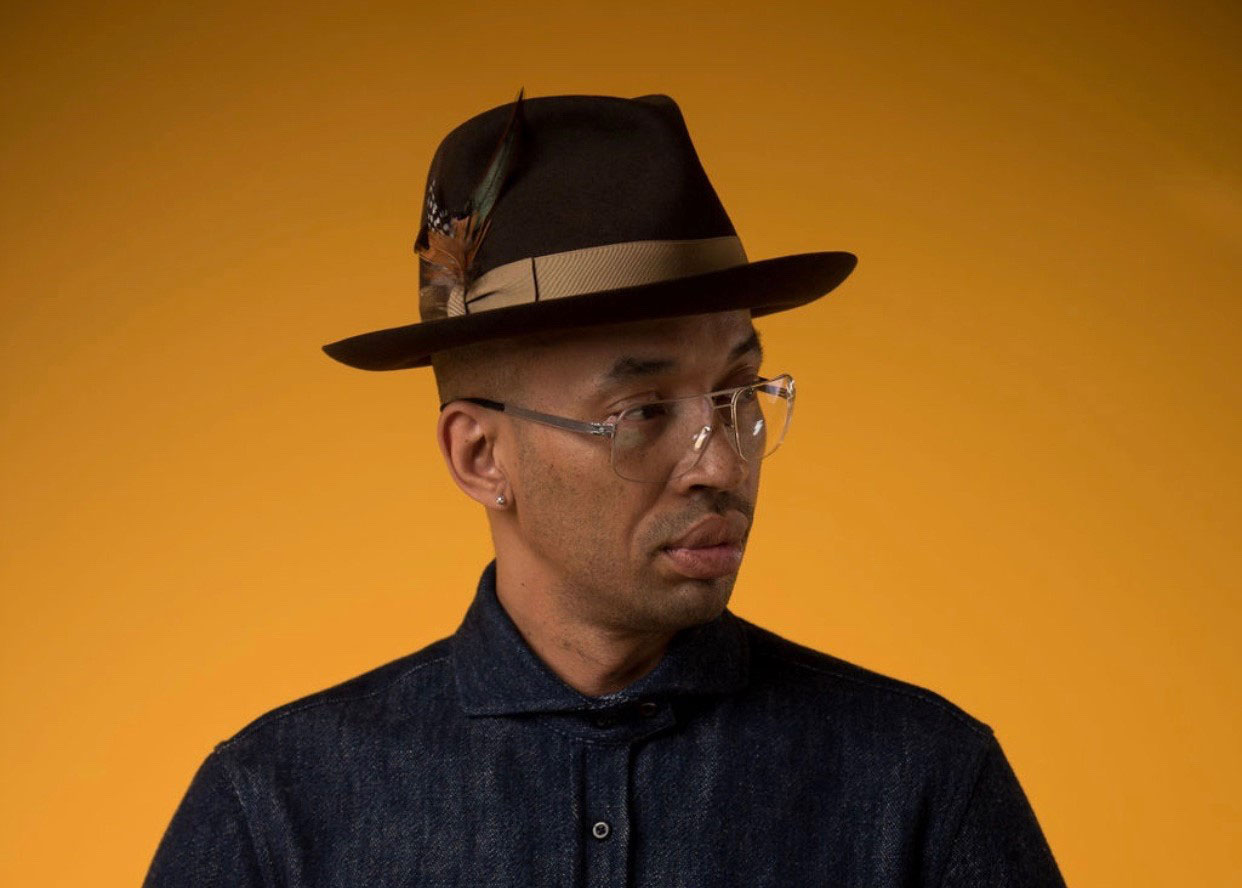
RICH
MEDINA
Where can we practice what it means to be together? What is at stake if we lose places to celebrate?
Photograph by Malcolm Jay Williams
Watch our conversation with Rich Medina and read along below.
Video Transcript
Rich Medina is a world-renowned, Philadelphia-based DJ, producer, poet, journalist, and lecturer on hip hop and music theory. Since the onset of the Covid-19 pandemic, Rich has been cultivating a vibrant online space for a globe-spanning community to gather, listen, dance, meditate, and tap into collective joy and release during a time of social isolation.
A record that has soothed me in 2020? Man, every record that I bought and put on a machine in front of a group of people is the record that soothes me in 2020. But if I had to pick something, I would go back to old faithful, which is my favorite song ever, and that is "Sunday and Sister Jones" by Roberta Flack.
Music has always been a safety net, a roof, insulation, muscle, savior, physical healing, mental healing, spiritual healing, you name it.
I grew up in a Baptist church. If you know anything about the Baptist church: without music, there is no worship. But in a Baptist church, without melody, harmony, and rejoicing, we have nothing to talk about. That's what we're there for.
Black church is rooted in the clandestine congregation, which is where we went to pray to the gods and the beliefs that were denied to us in our service as slaves. So there is a musical and celebratory element to it, because the rest of our lives at one point was all labor, all work for free. So you go hearing the swing of Black music and the sideways bounce of gospel music versus military music, and all of those things is rooted in celebration and rooted in finding solace in things that are free of solace by design, you know?
People spend six days a week being a heathen, and then get dressed on a Sunday in their Sunday best and go stand in a building and testify to justify all the bullshit they did all week. Sunday, they are indeed in a clean tether to whatever it is that they believe that's above them, and the way that I've experienced that is through music. My grandmother was the choir director of our church. My grandfather was the deacon of that church, and my grandfather built nine churches in New Jersey in the thirties and forties.
When they kept writing and arithmetic away from us, what did we have except labor and creativity to pass the time? It's almost like the behavior of someone who was on a prison yard — is it not? Ain't no instruments in there but you gonna find a way to get some rhythm in your life. You're gonna find a way to get to something that's gonna give you something that can help you see over that wall.
I was born in '69, I was the first person in my family, first generation out of the third Civil Rights Era. So we was doing a lot of fucking celebrating. You know what I mean? And it came through that route, so it's always been a piece of my fabric. I don't know any better.
Party As Congregation
A club kid finds god in every mix that makes them do a more difficult move than they did the last time they got to step in the circle. The cool guy pulling his back off the wall five songs into ice grilling everybody within 10 feet of him for those first five songs is dealing with something divine. It's above him, he is now compelled. He gets touched by that cadence or by that girl who — she might not be the best dancer in the room, but she don't give a shit what you think about how she looks — she's in the spirit, she's speaking in tongues. She's in a whole other place, and she makes the cool guy realize that he ain't got all the answers.
So it is a congregation, it is an ecosystem. We do feed off of each other, it's tribal, it's call and response. It's a secular congregation, though, it is a congregation, we're just not speaking directly to a higher power verbally or calling on a higher power to provide us with what we feel we're not being provided or to speak to them about our understanding that if we just toil through this in the everlasting on, we will be with Him.
It's because of that congregation, it's because of that church, and that space is rooted in care: self-care, care for others, piety, nobility, right and wrong, up and down, the fact that your savior was a hustler — a Brown one at that — and that's where we have these beautiful spaces that let us know how the world is really working.
To lose the institution of the party is gonna put the people that really thrive on the existence of the party in a position to pirate that party, you know? It's pirate radio at that point. We're gonna squat it. You don't want to give us the space to get busy? We're gonna squat it. While we're squatting it, if you don't approach us with a certain vocabulary, we're gonna confront you, because you're bringing confrontation. We don't want no smoke, but we got a couple smoke machines, if you wanna play like that.
Just let us be, and let us have our space. We're over here minding our own business, and actually, adding to the social and emotional GNP of your life, and you don't even know it. So, leave me alone. Let me do what I'm doing, 'cause what I'm doing is good for the world. Just because it doesn't fit in a construct and you can't monetize it, and you can't see the value in it because it doesn't touch you emotionally in the same way, doesn't mean them frequencies ain't enhancing your life. So you should be glad that we're here.

Redefining Together
Even when the world opens back up, the tentativeness of the human nature and the nastiness of the systems that we function under, the old world that you think you're going back to is actually going to be the working definition of the new world order, and part of that begs of us to embrace technology and embrace methods that we can reach audiences without physically being in the same place. And to monetize that, if you can, and to try to make that virtual space as human as possible, because that's the whole quest for fire with social networks anyway — a social space that's not social.
We're gonna double back on that theory and actually make it truly social where I'm not just social with my thumbs or with my index fingers, but I'm social with my presence. And when you go to one of my parties on my Twitch page, if you're paying attention to the chat, you can get on a Zoom and put your camera where you want it, and if you're dancing and you're enjoying yourself and I see it in the gallery view, you become the person who is now inside the party with me, showing the world that I can be tethered to this person without being in the same place and get touched by all those frequencies and all of those vibrations, and all that translative stuff, and all that fire and brimstone, and all that secular preaching, and all that hustler talk that comes into making people come together.
So we have to redefine what together is.
We all got different ways of moving, but we come back to these spaces and these containers that all give us this positivity and give us this, put gas in our tank to move on and move forward and get through whatever you're going through. For all the reasons that you guys are bringing out in this conversation — the bulk of my world is rooted in gatherings and meetings and congregations of folks that are like-minded or they're bringing folks that they want to turn their minds to what this thing is and why it's so good for them, you bring your friends that have never been to turn them on.

Archiving as a Duty to Ancestors
People died so that I can utilize the education that I've been given and the life experience that the people before me fortified me with, to speak to revisionist history with gusto. That's my job. Everything else is tertiary to having the wherewithal to speak to revisionist history and cognitive dissonance with gusto — with the gusto of an executive, with the gusto of a man that has a PhD in being Black, and how women's plight and Brown people's plight has been parallel in the eyes of the white man, because both Brown people and women are still playing from behind on the aggregate.
So I feel obligated, I feel extremely obligated to that task of presenting that point as best I can, as often as I can, because I have the information and if I take it with me, I wasted everybody's fucking time.
I mean, I'm an archivist, I'm sitting in my archive of the things that have carried me through my life, some of those things. The archiving of performance, at this point, that's the only money you have to put in the bank, is proof that you were there, proof that you did it. That's why you go to the library, to get a book on some shit that you don't have direct access to.
We as makers, we as educators have the ability now with technology set up the way it is to document every single thing that we do, and so those of us in job capacities that are, by default, contributory to the notion of care and the notion of uplifting and helping people, that documentation is the thing that would bear well for us in a figurative court, with a judge of a jury of our peers, if we had to prove that our point is correct or not. It's the only thing we have next to money, to put us in a position to prove our point.

